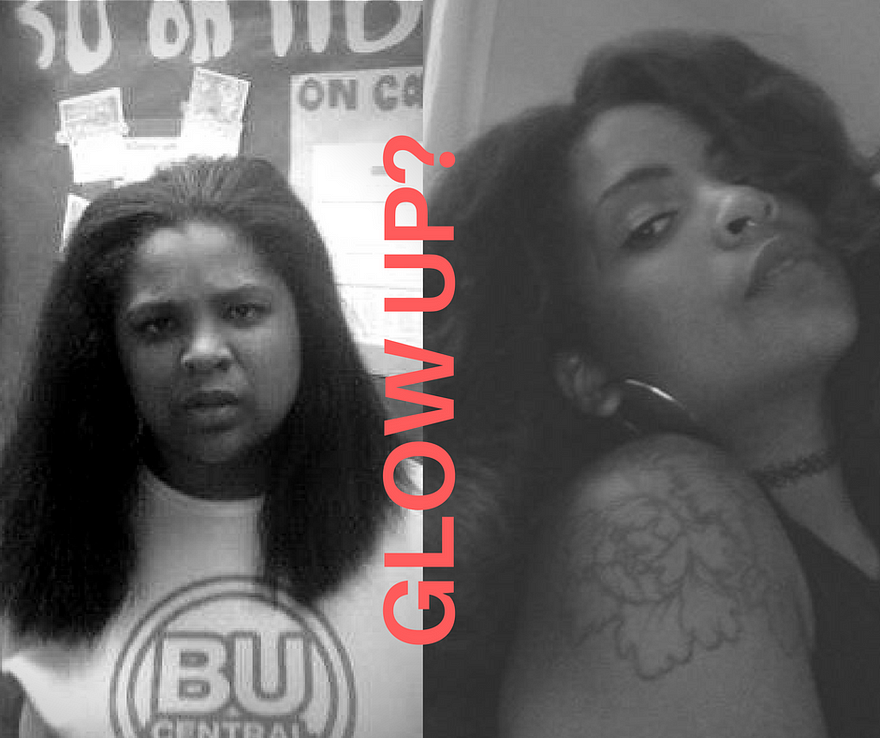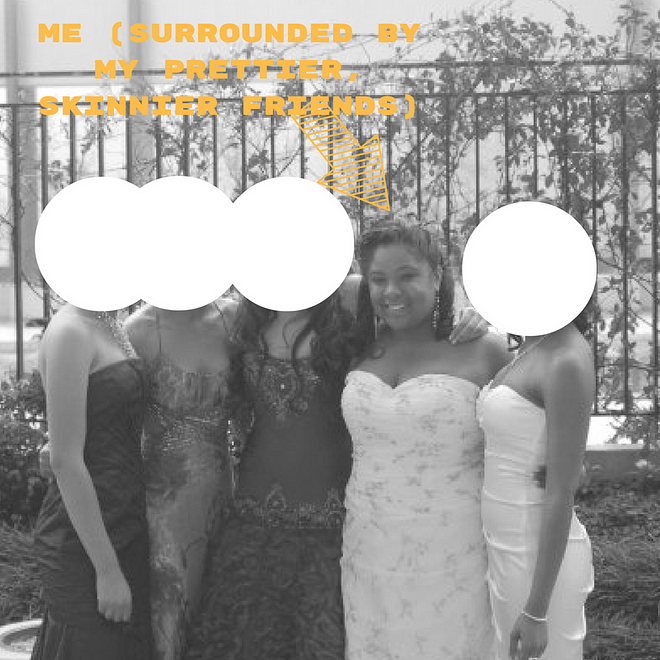
(Before the weight loss on the right, after on the left)
Up until about 4 years ago, I was clinically obese. Diagnosed with PCOS and Insulin Resistance at the onset puberty, I had a double dosed cocktail of hormonal imbalances that caused rapid weight gain. By my sophomore year of high school, I was packing over 200 lbs on my 5"3 petite frame.

I was always the big girl in the class, always the overweight one surrounded by skinnier, prettier friends.
I was the cool girl, the one with lots of guy friends. But the same patriarchal system that had me rejoicing in my ability to be “different” from the other women was also the same culprit behind why my guy friends only viewed me platonically in the first place. For most of them, my weight, in the simplest terms, made me unfuckable.
The sexual deprivation actually enhanced my creativity: I began pouring all my sexual frustrations into erotic fan fiction.
I learned a lot about the wonders of masturbation. I still garnered and harbored a myriad of insecurities because of my size but I learned to live without looking to my physical appearance for affirmation. Me avoiding myself in the mirror started out of hate but eventually morphed into an "I'm fat…and?" My weight, for the large part, became negligible in my mind.
Up until I lost a lot of weight I spent the majority of my time examining my life as black, as a woman and as both simultaneously.
I focused on everything outside of my appearance because I knew that as an obese black girl living in America, my appearances weren’t going to get me anywhere — although my privileges being light skinned and cis have helped me in numerous other circumstances.
I learned to rely solely on my inherent skills and abilities. I also learned to appreciate the beauty of being comfortable in my own fat skin.
I relied on men for nothing. Not for entertainment, not for a way to fill up an empty Saturday night, not for an orgasm, not for attention, not for a relationship or companionship.
That all changed when I lost weight.
I didn’t notice when I began to lose weight, but as family members and friends began commenting on the difference I definitely started to notice and I began to keep track.
In a little over a year, I lost close to 60 lbs. A part of me started leaning towards those compliments as if they were likes on Facebook. It was, in a way, satisfying and fulfilling. Everybody else was noticing, right? That's a good thing, right?
Then came the changes in how men treated me.
I’m not saying all men are dogs or pigs focused solely on physical appearance, but what we do know is that people who are considered conventionally attractive and palatable get certain privileges in our society. This is fact, not just experience.
Society touts skinny bodies as a panacea to life’s problems, a mythical beacon of hope that promises to change your life if you just drop the weight- the sick thing is that it’s true.
On average skinnier women make about $1.50 more than their overweight counterparts. Studies in 2011 show a steady increase in worldwide anti-fat prejudice and if this isn’t bad enough, this increasing fat bias is statistically way worse for women than it is for men.
While some studies show that many black women subscribe to different beauty standards than the traditional Eurocentric ones shoved down our throats, the fact remains that society as a whole has proven itself unable to see the humanity in fat people. This includes the black community.
For a recent example, look at Gabourey Sidibe and the severe backlash she faced on Twitter for her character's sex scene on the Fox original show Empire. Her clap back was so intense it inspired the amazing hashtag #MyFatSexStory. But why?
Simply put: people were uncomfortable with seeing a plus sized black woman get her rocks off. In our society, fat women don't get the man and they're definitely not shown on screen getting down.
My experiences, before and after I lost weight, were vastly different. Living life as an overweight woman was like living life as an invisible specter. Besides the fat jokes, I was ignored by the vast majority of the people I came into contact with unless they were friends or family. But once I lost weight I became uncomfortably aware in which all the ways my existence had shifted in society’s eyes.
Skinny in our society is equitable to value.
Losing weight immediately affected how men treated me in public. Looking more like societal beauty standards meant that men opened doors for me, stopped to let me cross the street, got up on the train to allow me to sit. At first, I was vainly enamored by all the attention I was receiving. Then I took a closer look at the ugly underbelly as to why I had wanted to lose weight in the first place.
Why wasn’t I happy after losing all that weight?
I lost weight to become less insecure without realizing my insecurities ran deeper than that.
Losing weight didn’t magically solve all my self-esteem issues like I thought it would because I had a superficial idea of what “self-esteem” should be.
Losing weight was like slapping a band aid on a pulsating wound. I thought that if I lost weight I would be happier because I’d have the body I always craved for. What I didn’t realize was that me craving a smaller body was not only adhering to traditional western beauty standards, but also me ignoring all of the things I disliked about myself on the inside.
Which leads into my next point:
I did not want to lose weight to be healthy. I wanted to lose weight to be skinny.
I wasn’t intentionally losing weight for my health. Getting healthy and being able to increase my physical scope was a plus, but those weren’t driving reasons behind me dropping pounds. As of today, I’ve gained over 30lbs back of the initial 60lbs I lost, but what I had to accept was that focusing on weight loss right now may be good for my body but not for my mind.
Weight loss caused me to unconsciously crave traditional patriarchal guided attention. What I mean by this was that once I lost weight and shifted back into the realm of visibility for most people, I began to shift my way of thinking as well. I began caring more about what I looked like, but not for my sake. I found myself rather, tieing my self-esteem to the approval of good-looking men. I began thinking of my body in terms of consumption when I hadn’t thought about commodifying my body before.
When I was overweight, I was more secure in my abilities and talents
I learned to truly value my inherent talents when I was a plus sized gal. What I didn’t realize when I lost weight was that I valued my talents less and my weight loss more.
This is only my story with how I became infatuated with the weight loss.
No matter your size, you should always be wholly happy with how you exist, both on the inside and outside. I became too preoccupied with the outside and fell into an emotional hole I’m still trying to climb out of. But there is a silver lining: all of this has led me to the realization that I am beautiful, no matter the casing, no matter the skin, that surrounds this light within.

